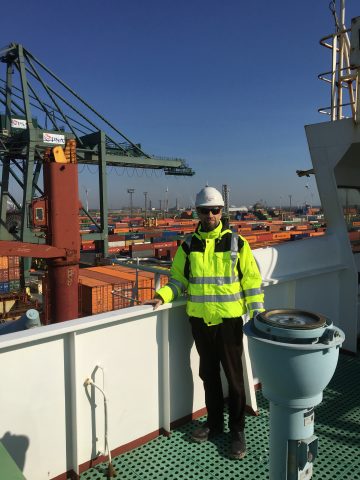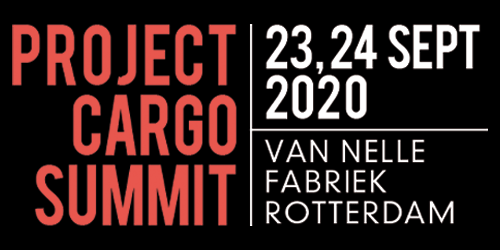‘Complex transport of project cargo? Think before you outsource’
 Jurgen Huygh is increasingly taking the organisation of the project cargo logistics of CG Power Systems Belgium into his own hands. Deliberately, as he feels that traditional forwarders provide insufficient added value; they lack expertise, flexibility and customer focus. His advice: ‘Don’t always think conventionally simply because “that is how we have been doing things for years”. Dare to be creative too. Look for other solutions that benefit the shipper.’
Jurgen Huygh is increasingly taking the organisation of the project cargo logistics of CG Power Systems Belgium into his own hands. Deliberately, as he feels that traditional forwarders provide insufficient added value; they lack expertise, flexibility and customer focus. His advice: ‘Don’t always think conventionally simply because “that is how we have been doing things for years”. Dare to be creative too. Look for other solutions that benefit the shipper.’
This is also the message Jurgen Huygh will convey at the Project Cargo Summit. He is one of the speakers on the first morning, when the shippers share their views. At CG Power Systems Belgium, Huygh among other things bears responsibility for shipping and traffic management of the transformer factory in Mechelen, Belgium. In addition, he is vice-chairman of the OTM, the Belgian organisation of traffic managers that looks after the interests of shippers.
How big and heavy are the transformers that you manufacture?
‘The lightest are two to three tonnes; the heaviest weigh about a hundred times more. Once, we even transported one weighing 280 tonnes. A transformer of 326 tonnes is planned for 2019.’
‘Assembled transformers of about 20 tonnes can easily measures three to four metres in height and width. In terms of transport, that is exceptional load territory. Anything up to 100 tonnes is not particularly spectacular though; after all, most countries in Europe have specific route networks to transport such tonnages. Above that, we shift to project management for the transport part. Such transport operations are more interesting and often constitute more of a challenge.’
Do you do this yourself or do you outsource?
‘Two elements are of major importance in that respect. In the first place, there is the Incoterm the customer uses when purchasing. The current trend is that they are increasingly selecting DAP (Delivered at Place, ed.). For the customer, such a transport is a one-off thing and he assumes that we, the manufacturer, have more experience in this field. But we also have transformers that are ordered FCA (Free Carrier) from Mechelen – for example from France – and these are collected by the customer itself.
Secondly, we endeavour to do as much in-house as possible. Provided this is feasible for the destination in question of course, because we also try to minimise the potential risks. We have accumulated the knowledge for destinations in Europe ourselves; for more exotic destinations, we prefer to work together with specialised forwarders.
In-house, we mainly focus on the strategic/tactical preparations. In the implementation phase, we do however work together with third parties: asset players, operators who perform the actual driving or lifting operations. You can outsource the transport to a forwarder, but over the years we have found that in many cases this does not result in the most optimal total solution. Or at least not the most interesting solution for us as the client in terms of Total Cost of Ownership.’
Could you elaborate on that?
‘They do not always have sufficient knowledge for project cargo. A while back I had to ship a transformer to the United States and none of the forwarders that I consulted managed to come up with a satisfactory solution. I was able to come up with one myself though and I ended up suggesting this to them. A transformer of 70 tonnes was involved, so everyone automatically thought of a breakbulk ship. However… those carriers offer only one sailing per month. That was not compatible with our planning and that of the customer. In the end, I arrived at Hapag Lloyd/CMA CGM; they are increasingly loading breakbulk aboard their container ships and are one of the first shipping lines to establish a specialised division for this. The higher price is a drawback, but the main advantage is a guaranteed weekly sailing and shorter transit times; depending on the bigger picture, this may even be the most cost-efficient solution.’
How are they falling short?
‘Most forwarders are generalists; they mainly act as transport brokers. If pure sea freight is involved or an exotic destination for which the forwarder belongs to a group with a network that has knowledge about that specific destination…Then yes, there is added value. The same applies to Fourth Party Logistics providers that act as chain directors. I myself for example use DHL Global Forwarding to ship small transformers to Canada and Hong Kong in open top containers, because their service provision is solid and they control the chain from A to Z.’
Local forwarders would do well to contemplate their role and their added value. They should adopt a more pro-active stance and be more creative. Think along with their customers, not be afraid to think outside the box and explore solutions beyond their own silos. Regarding transport, I always try to seek out the most cost-efficient solution. That is not necessarily always the cheapest solution though. Factors such as time savings or reduced manufacturing costs are also relevant. Shipping an assembled transformer is more complex and expensive but reduces the lead time, assembly costs, etc. and all these elements must be taken into consideration. What matters is the bigger picture and delivering to the customer on time. Because the penalties for late delivery are often quite considerable.’
And the transport is often complex …
‘Every exceptional load is unique. There are no manuals. You almost need to start from scratch for each new project. All the knowledge for this is present within our company. For that reason, I am taking more and more control of the organisation of our project cargo logistics myself. In terms of implementation, I increasingly work directly with fixed asset players. An example of an important fixed asset player for everything related to the transport of exceptional loads in Belgium is Van Egdom transport. That saves me the surcharge that a forwarder would otherwise add on top of the costs of that carrier. Plus the communication is more direct and therefore less complex. Last but not least, it offers flexibility and if any problems arise we look for solutions together.
Of course, this strategy is more time-consuming for me, but we see this as an investment. This brings us knowledge and experience that allows us to do even more in-house.’
Do you work with fixed carriers?
‘Yes, we are increasingly working with the same parties because of the aforementioned advantages. I do not shop around. I am prepared to pay for reliability and assurance. This is also encouraged by our insurer, with whom we work closely together in terms of, for example, prevention. Ten thousand euros worth of damage is peanuts in relation to a transformer costing two or three million euros. But if that transformer has to go back to the factory to repair the damage, the extra transport costs can be exponentially higher.’
Register here for the Project Cargo Summit on the 12th and 13th of September.
Author: Martin Dekker
Date: the 16th of August 2018
morenews
Project Cargo Summit 2024 registrations open
The time has come, we have opened registrations for this year’s edition of the Project Cargo Summit. As it was previously unveiled, the Port of Bilbao will be our host on September 17 and 18. There have been some changes since the announcement.
Project Cargo Summit goes to Bilbao
Following the successful outing in Bremen in 2023, ProMedia and its Project Cargo Summit team have turned their sights to a new adventure and have partnered with the Port of Bilbao. So for the 2024 edition of the Project Cargo Summit, project cargo, breakbulk and heavy lift industry specialists will gather in Bilbao for two… Read more ›
Project Cargo Summit 2024 programme takes shape
Excitement is building for the Project Cargo Summit 2024 in Bilbao, Spain! The dates are locked in (September 17th and 18th), the speaker list is filling up fast, and preparations are underway to make the “Project Cargo Summit 2024: Mega Cargo, Mega Solutions” an unforgettable event.
